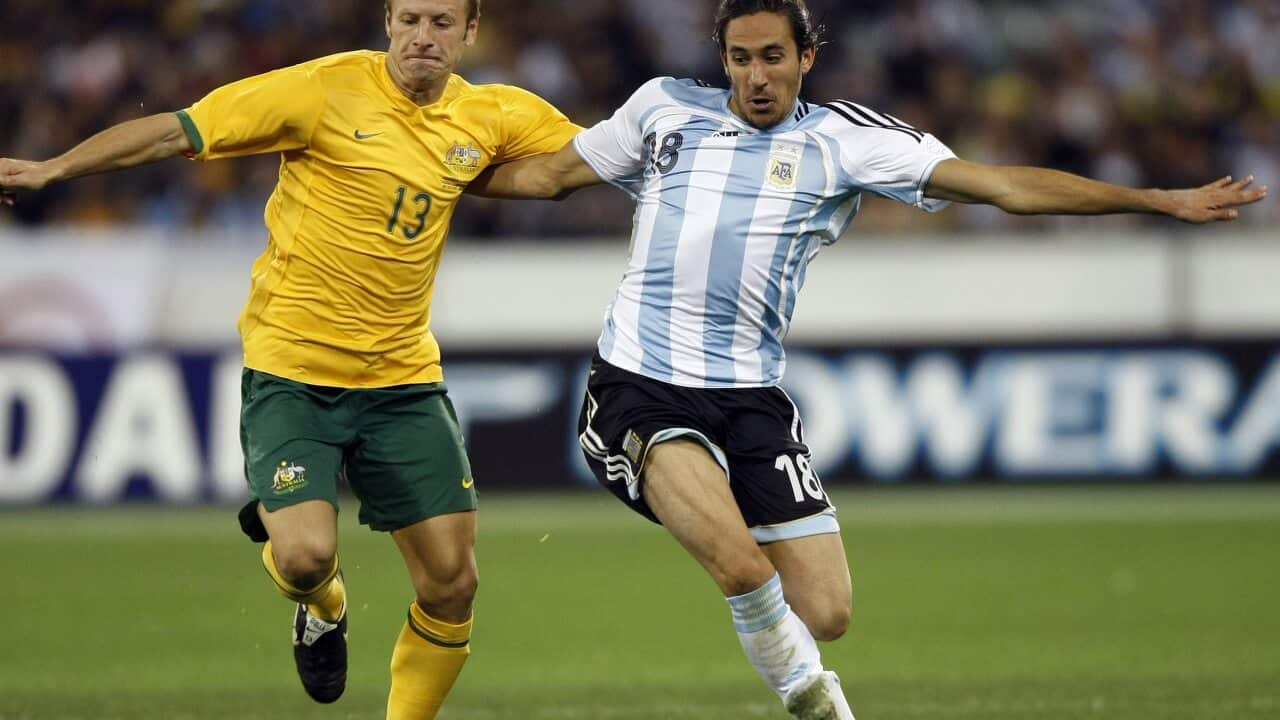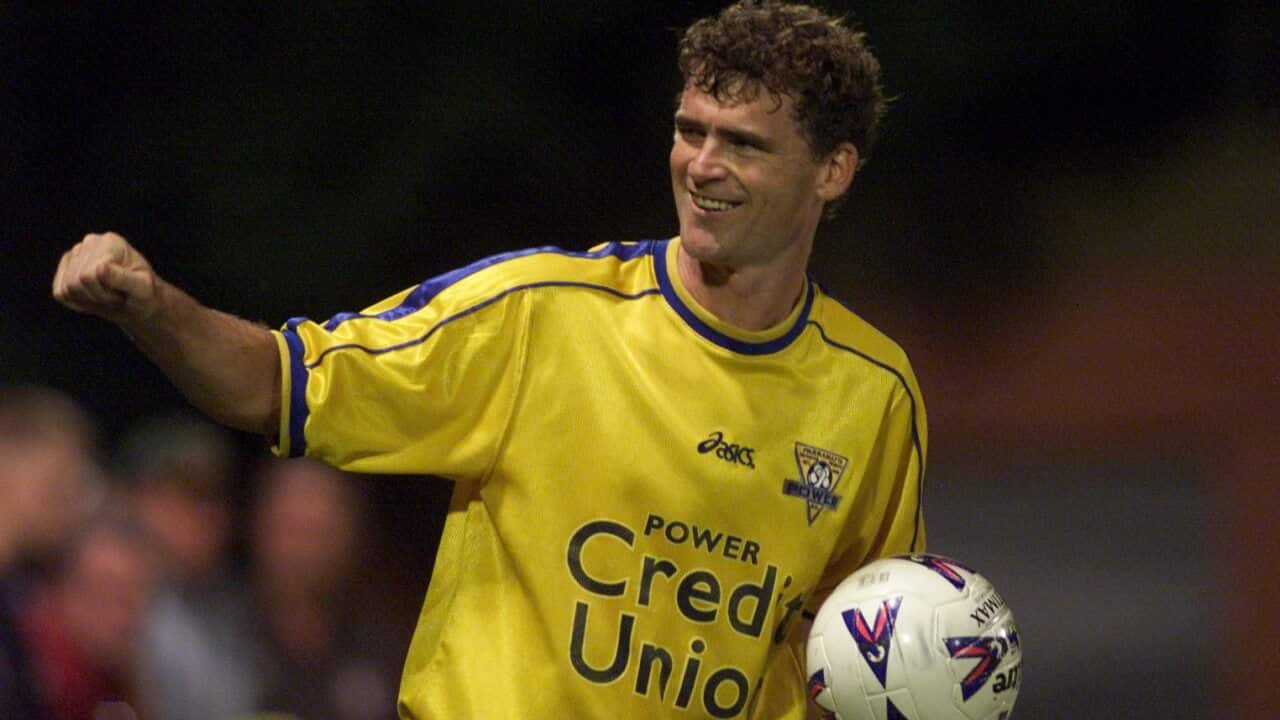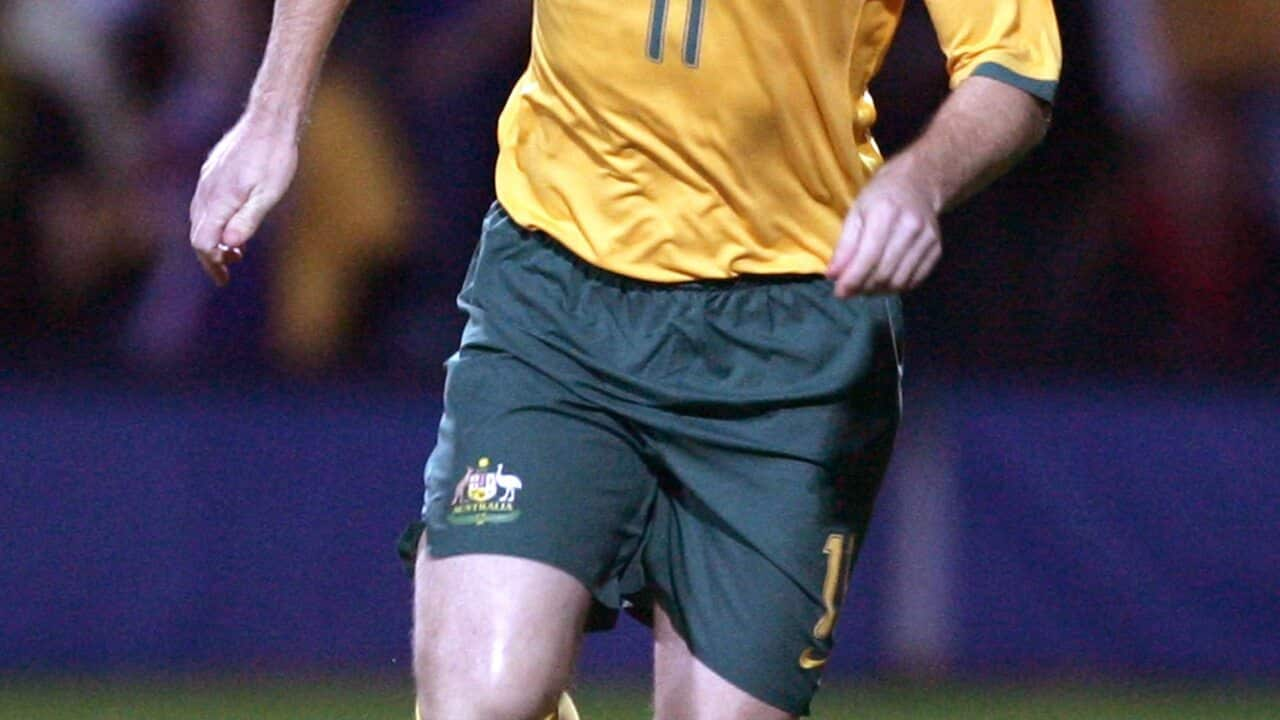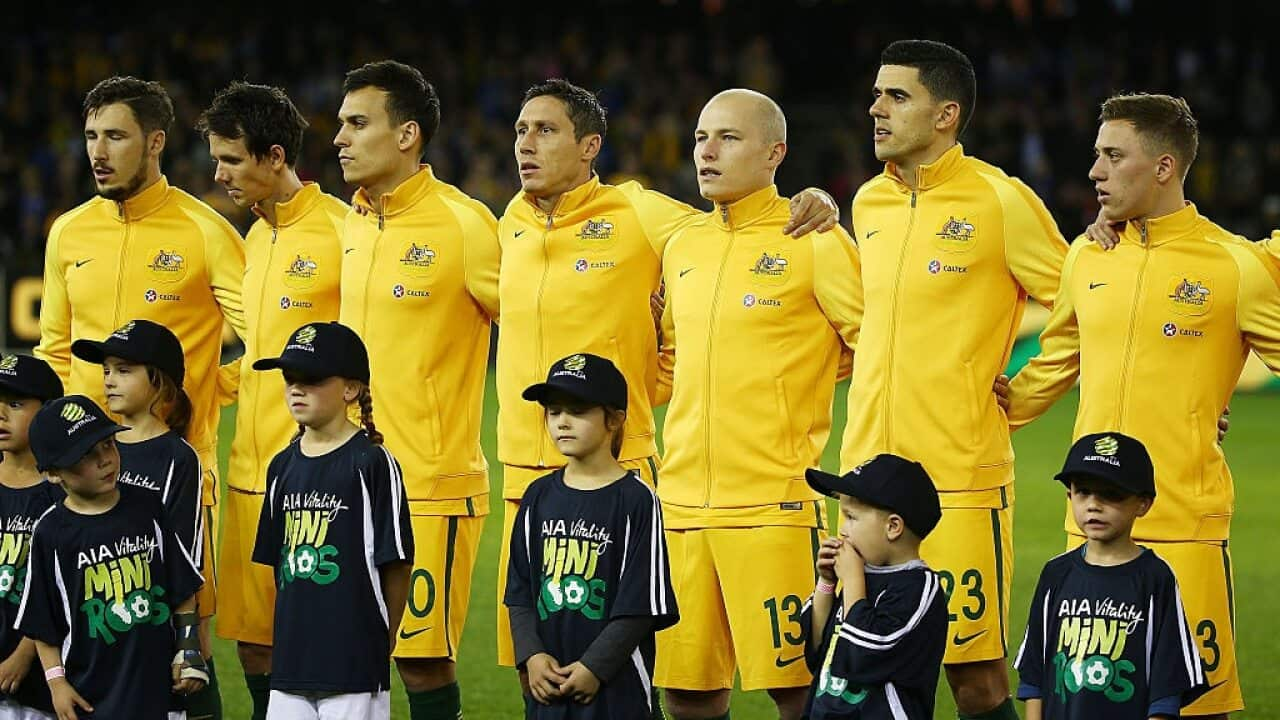Australia's World Cup midfielder Vince Grella has revealed he could have extended his career and played more games for the Socceroos if he spent less time in English football and returned 'home' to Italy.
Grella played for 10 years in Italy and four in England and represented Australia 46 times but he admitted he could have played a few more years for the national team if he left Blackburn Rovers two years earlier.
Grella, who is now 37, joined Melbourne Heart in 2012 but by that time a long career of fighting in the trenches at the highest level took its toll on his body and he was forced to retire after just one game in the A-League.
"I have one regret from my football career, which is persisting and not seeing the writing on the wall during my four-year period in England," he said.
"Blackburn invested a lot of money in me and I started every pre-season thinking it was going to be the year I was going to dig my claws into the club.
"I actually performed well whenever I played. The problem was that I could not get my body right. You get into this tunnel that you cannot get out of unless you change the environment and the habits I put together there.
"I should have moved back to Italy a couple of years earlier ... had I done that I probably would have extended my career and played a few more years for the Socceroos.
"At the end of my time in Blackburn in 2012 I went back to Italy and I had a think about what I wanted to do. I had been talking to then Heart coach John Aloisi about the possibility of coming to the A-League but I was not sure about my body because I had a lot of physical problems.
"Then I decided to give it one last shot because I would not have lived with the thought of retiring without trying. I told John: 'Look, I have these issues. If it works it will be good and if it doesn't I will probably end up with egg on my face because in Australia everybody is waiting for you to trip over but I'm prepared to take on the responsibility.' For Aloisi this was not a problem.
"I really did not have a chance because my body just failed me."
Grella, who was born in the Dandenongs outside Melbourne, lives in Florence and was happy to share his recollections of an extraordinary career.
So what are you doing now?
"I am a player agent and Italy is home now. Towards the end of my career I was doing a fair bit of work together with Professional Footballers Australia, giving good advice to young players who were not getting too much of it. This was conditioning their decision-making and consequently maybe hindering their development as footballers.
"I enjoyed spending time with young players and passing on my experiences to them and I thought this could be an opportunity for me to stay inside football.
"I met up with a top agent in Europe named Frank Trimboli, who was born in Australia, and I work with his company. At first he tried to convince me not to work for him because he did not want my name tarnished with the unfortunate brush of a player agent.
"But I said to him 'look, as long as I stick to what and who I am, I want to give it a shot.
"I started recruiting some Aussie players and here we are now. I'm looking after some players but I won't mention names because it would look like advertising and not too classy on my behalf."
You have worked hard to reach the top of your profession. Do you think some of today's young players are not prepared to make the sort of sacrifices you would have made when you left Carlton for Italy way back in 1998?
"They are prepared to make the necessary sacrifices, I just think they do not have the level of patience. Their determination is there but they want a reasonably quick result for their hard work.
"They might say 'I'll train hard for three months, do supplementary training, watch my diet, go to sleep early and I should play'. Unfortunately it is not so straight-forward and it does not work like that.
"There would be a hundred players who do the same thing and it's the consistency and persistence of banging on the door that make the difference.
"Because of the success of the A-League, the option of moving back to Australia is too inviting and it may damage their level of patience.
"There is also another thing. Foreign clubs expect Aussie players to show the physical attributes of members of the Socceroos teams of a couple of eras ago but they are hard to find in the modern player.
"Today our players are leaning more on the technical side of the game but unfortunately such players are abundant in Europe."
I could have bet my last dollar that you would end up in the media because you're a natural. Obviously there is more money to be made as an agent.
"To be honest with you, from the day I started this job about three years ago if I were to put my balance sheet together between the money I spent and earned I would just about break even.
"If I wanted to make more money I probably would not represent Australian players. I would go and get three or four good young Italians and make 10 times as much.
"My first goal actually was to be a coach. The reason I decided not to follow the coaching path is because I decided to live in Italy.
"And In Italy I have four or five former team-mates who are coaches of Serie A level and cannot find jobs. So I thought 'where am I going to fit into this crazy world of coaching in Italy?' I was an outsider as a player and I am an outsider as a coach.
"I just did not see how I was going to be successful and if I were I would have lost contact with Australian football, which is part of the reason I became an agent."
You ended up playing 182 matches in Serie A. How hard was it for this unknown footballer from Australia to be accepted in one of the world's major football countries?
"At that stage Italian football was at the top of the mountain. It was the league everyone wanted to play in and it had the best foreigners in the world.
"So obviously it was not easy to get game time and it took the best part of three years for me to do so.
"I was able to learn the Italian football culture rather quickly and I fitted into their style of football but it was definitely not an easy ride. It created the person that I am now."
You spent almost your entire career as a defensive midfielder. What is the secret behind doing that unfashionable and unrewarding job so well for so long?
"The secret of doing it well is understanding your limitations and feeling that even though the lights are not shining on you you are still an important part of the team.
"The consistency of your performance is often the foundation of your team's result.
"If you can accept not being the star of the show - and this comes back a bit to the personality of the player - you can have lasting success in that position.
"You do all the dirty work for the players in the final third of the field and also for the defenders.
"If you are on top of your game, you are stopping attacks and making defenders' jobs easier and if your passing is good and you're getting the ball into the right areas you're also highlighting the strengths of the strikers.
"You don't really get the recognition for your work and if you accept that then you're on your way."
What has Serie A taught you as a player and a person?
"As a player it taught me that football is all about winning games. Sometimes the beauty of the game gets smothered by the importance of the result.
"I lived and played in the United Kingdom for four years and I felt that while what's at stake financially is a lot greater in England the pressure to win in Italy is quadruple.
"In Italy they taught me a lot how to grind out results and sometimes you win a game without playing open, attractive football.
"As a person I think I was pretty mentally strong before I came to Italy. I think my approach fitted in well with the circumstances I had in front of me. I am now passing on my experiences to young players in regards to what they have to do to make it in Europe." The Italians are seen as football's master tacticians who would prepare for a match meticulously. Is this really true or a bit of a myth?
The Italians are seen as football's master tacticians who would prepare for a match meticulously. Is this really true or a bit of a myth?

"It is very true and you soon realise it is more intense when you come here and live here. The Italians eat, drink and dream tactics. It is present in every single thing they do. And the lengths they take analysis to, even on television ...
"It's because that is what the people want to hear. The want to be involved in the understanding and criticism of the tactics.
"Coaches are just as obsessed."
So as a player do you feel it can be a bit too much?
"For me it was fine. I think it was the foundation of my success."
Which is the highlight of your long career in Italy, the memory that will stay with you for the rest of your life?
"I would have to say that walking out onto the San Siro pitch as captain of Parma at 25 years of age next to AC Milan skipper Paolo Maldini was the highlight of my life as a footballer in Serie A.
"When I stood in the tunnel of the famous Milan stadium next to such a legend as Maldini it was pretty special. It was a totally different Milan to the one we see today, without being disrespectful. When you play against guys like Alessandro Nesta, Serginho, Clarence Seedorf, Kaka, Andrea Pirlo, Andrij Shevchenko and Filippo Inzaghi ... well, it is very hard to get much better than that. That memory will stick in my mind for ever."
You were part of the so-called Socceroos' golden generation. What made that team so strong?
"I'll be honest with you: we found the right coach at the right time in Guus Hiddink.
"One of the biggest difficulties of Australian football was when the national team got together with players scattered all over Europe, playing in several countries and with different tactics, it was not easy for a coach to prepare and bring out the best qualities of every individual in the team when he had only a few days in which to do it.
"So you always have to compromise and in my opinion before Hiddink arrived we always tried to play a game that was a little bit more English in a style that did not quite marry the characteristics of our playing squad.
"Hiddink for me was the best because the quality of players was there and all that was needed was a tactical adjustment. He understood this and modified the team structure straight away, giving us more flexibility. All of a sudden the exact same playing group starting playing better and obtaining better results.
"For me that was the biggest difference."
What was your greatest moment in the green and gold?
"Only one really: the game against Uruguay in Sydney in 2005. I don't think I will ever forget that night until the day I die. Forget about the actual game. I still remember the morning of the game, waking up. I went to train at Parramatta Stadium with Tony Popovic, Joe Skoko, Mark Schwarzer and fitness coach Anthony Crea. We had a bit of a jog, a kick and a stretch. It was a free morning and I always used to train in the morning of a night game. More than anything I had to get out of the hotel and smell the fresh air. I hated sitting on the bed, playing with the phone or watching television. We all know what happened later, of course. The game was unforgettable."
As an agent you must watch the A-League.
"A lot. I try to watch most matches in a round between Mondays and Wednesdays by downloading the games onto my computer."
What do you think of the standard?
"It's improving. We have some good coaches in Australia at the moment who are putting together some positive stuff. I would like to see the game played in its proper climate because you just cannot have high-intensity football in the middle of summer. I know it's very hard in Australia but for us to get to the next level we need to play the game in its proper climate, which is in winter."
What's your opinion on the Socceroos team in terms of personnel and style?
"The playing group is pretty strong and I think Ange Postecoglou has some pretty good options. He can go to his bench with confidence any time.
"Regarding the playing style, this is always a tricky question. For me the style is all about the result. Why persist with a style of football if you don't win? If you tell me 'come and watch my team play, we play fantastic football but we always lose four-nil. I tell you, there is absolutely nothing fantastic about using four-nil'."
You've shared a football pitch with some great players. Who are the best you have played with and against?
"I hope this will not be seen as a case of 'rubbing your mate's back' because this has nothing to do with friendship and all to do with football: the best I've ever played with is Mark Bresciano and I'll give you an explanation why.
"Apart from being so adaptable to so many different styles, Bresciano always puts himself at the service of the team before his personal benefit which is not normal.
"I played with him at Carlton, Empoli, Parma and the Australian junior and senior teams and he never changed his approach the higher the level he was at. He was a special person and I don't think I need to start talking about his playing ability, which was extraordinary.
"Milan's Kaka was the finest player I faced. I played him a dozen times or so. He was a very special player, particularly in that two-year period when he won FIFA player of the year (in 2007). Juventus's Alessandro Del Piero was also a great match-winner."
And finally, who are the players you admire most abroad and in Australia?
"I have lots of admiration for Francesco Totti for the way he keeps presenting himself with the enthusiasm of a 20-year-old when he's 40. Sitting on the bench must burn his stomach but when he comes on he can change the game.
"In Australia it would have to be Carl Valeri. He has had many hiccups and injuries but he keeps coming back for more. He reminds me of the boxer who gets knocked down and keeps getting up. Carl is a player I really admire and he is Melbourne Victory's most important player who is fundamental to their success."
VINCE GRELLA FACTFILE
Club career:
1996-1997: Canberra Cosmos
1997-1998: Carlton
1998-2000: Empoli
2000-2001: Ternana (on loan)
2001-2004: Empoli
2004-2007: Parma
2007-2008: Torino
2008-2012: Blackburn Rovers
2012-2013: Melbourne Heart
International career:
Australia: 46 matches













